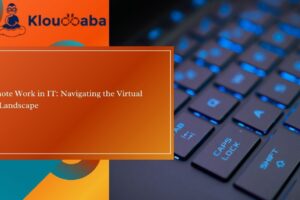
Tech Jargon Decoded: A Glossary for IT Career Starters
Tech Jargon Decoded: A Glossary for IT Career Starters- Welcome to our comprehensive guide on “Tech Jargon Decoded: A Glossary for IT Career Starters.” Starting a career in the field of Information Technology (IT) can be both exciting and challenging, especially for beginners who may find themselves navigating a sea of technical terminology. In this post, we aim to demystify the world of IT jargon by providing a curated glossary of essential terms tailored specifically for those embarking on their journey in the IT industry. Let’s dive in and empower you with the knowledge you need to kickstart your IT career with confidence.
Also Check: The Non-Techie’s Guide to IT: A Primer for Beginners
Importance of Understanding Tech Jargon
Embarking on a career in Information Technology (IT) is akin to entering a dynamic universe filled with intricate technical terminology. For IT career starters, grasping this jargon is not merely an option but a fundamental necessity. Here’s why understanding tech jargon is of paramount importance:
- Enhanced Communication and Collaboration:
- Proficiency in technical terminology facilitates effective communication within IT teams.
- Understanding and using common tech jargon ensures clarity in discussions, reducing the likelihood of misunderstandings and fostering seamless collaboration.
- Comprehensive Comprehension of Tasks:
- Technical documentation, manuals, and discussions are rife with specific terms.
- A solid grasp of tech jargon ensures IT professionals can fully comprehend these materials, enabling them to execute tasks with precision and accuracy.
- Adaptability in a Rapidly Evolving Landscape:
- The IT industry is known for its rapid evolution, with new technologies and concepts emerging regularly.
- Individuals who understand tech jargon can more easily adapt to industry changes, staying relevant and capable of embracing novel technologies.
- Facilitates Problem-Solving:
- Troubleshooting and problem-solving are integral aspects of IT roles.
- Familiarity with technical terms expedites the problem-solving process, allowing IT professionals to diagnose issues efficiently and implement effective solutions.
- Confidence in Interactions:
- A robust command of tech jargon instills confidence in IT career starters during interviews, meetings, and professional interactions.
- Confident communication is key to establishing credibility and showcasing one’s expertise in the IT domain.
- Foundation for Continuous Learning:
- Technical terminology serves as the foundation for deeper learning and specialization within the IT field.
- A solid understanding of fundamental terms lays the groundwork for continuous learning and career advancement.
In essence, understanding tech jargon is not just about deciphering language—it’s a cornerstone for success in the dynamic and ever-evolving realm of Information Technology.
Essential Terms Every IT Career Starter Should Know
As you embark on your journey in the field of Information Technology (IT), familiarizing yourself with fundamental technical terms is crucial for building a strong foundation. Below are essential terms that every IT career starter should know:
- Programming Languages:
- Java: A versatile, object-oriented programming language commonly used for web development, mobile applications, and enterprise software.
- Python: Known for its simplicity and readability, Python is widely used in areas such as data science, artificial intelligence, and web development.
- JavaScript: A scripting language primarily used for creating interactive and dynamic web content.
- Networking Protocols:
- TCP/IP: The foundational protocol suite for internet communication, governing how data is transmitted between devices over the internet.
- HTTP/HTTPS: Hypertext Transfer Protocol (Secure) facilitates communication between web browsers and servers, enabling the retrieval and display of web pages.
- Hardware Components:
- CPU (Central Processing Unit): The “brain” of a computer, responsible for executing instructions and processing data.
- RAM (Random Access Memory): Temporary storage that allows computers to access data quickly, facilitating multitasking and performance.
- Hard Drive: Permanent storage for data and programs, typically consisting of magnetic or solid-state drives.
- Software Development Methodologies:
- Agile: An iterative approach to software development that emphasizes flexibility, collaboration, and customer feedback throughout the development process.
- Waterfall: A linear and sequential software development model, where each phase must be completed before moving to the next.
- Cybersecurity Concepts:
- Encryption: The process of converting data into a secure format to prevent unauthorized access or interception.
- Firewall: A network security device that monitors and controls incoming and outgoing traffic, protecting against unauthorized access and cyber threats.
- Cloud Computing Terminology:
- IaaS (Infrastructure as a Service): Cloud computing service that provides virtualized computing resources over the internet, such as servers, storage, and networking.
- SaaS (Software as a Service): Cloud-based software delivery model where applications are hosted by a third-party provider and accessed over the internet.
By familiarizing yourself with these essential terms, you’ll be better equipped to navigate the diverse landscape of Information Technology and lay the groundwork for a successful career in IT.
Also Check: Resume Revamp: Tailoring Your CV for IT Job Applications
Tips for Learning and Retaining Technical Terminology
Acquiring and retaining technical terminology is a significant aspect of launching a successful career in Information Technology (IT). Here are some effective tips to help IT career starters learn and retain technical terms:
- Create Flashcards:
- Use flashcards to memorize technical terms and their definitions.
- Review the flashcards regularly to reinforce your understanding and retention of the terminology.
- Use Mnemonic Devices:
- Create mnemonic devices or memory aids to associate technical terms with familiar concepts or phrases.
- Mnemonics can help you recall complex terminology more easily during exams or real-world scenarios.
- Engage in Hands-On Practice:
- Apply technical terminology in real-world scenarios through hands-on practice.
- Experiment with coding, networking configurations, or system administration tasks to reinforce your understanding of the terminology in practical contexts.
- Immerse Yourself in the Language:
- Immerse yourself in IT-related content such as articles, tutorials, videos, and forums.
- Exposure to technical terminology in various contexts will deepen your understanding and familiarity with the language.
- Participate in Study Groups:
- Join study groups or online communities where you can discuss technical concepts and terminologies with peers.
- Collaborative learning can provide valuable insights and perspectives, enhancing your retention of technical terminology.
- Review and Reinforce Regularly:
- Set aside dedicated time to review and reinforce your knowledge of technical terminology regularly.
- Consistent practice and revision are key to retaining the information over the long term.
- Apply the Terminology in Context:
- Practice using technical terminology in written and verbal communication.
- Incorporate the terminology into your conversations, emails, and documentation to solidify your understanding and fluency.
By incorporating these tips into your learning routine, you can effectively learn and retain technical terminology, setting a strong foundation for your career growth in the field of Information Technology.
Common Misconceptions and Pitfalls to Avoid
While learning technical terminology, IT career starters may encounter common misconceptions or pitfalls that can hinder their understanding. Let’s explore some of these pitfalls and how to avoid them:
- Assuming Familiarity Equals Understanding:
- Pitfall: Mistaking familiarity with technical terms for a deep understanding of their meanings and implications.
- Solution: Take the time to research and fully comprehend the nuances of each term, ensuring a thorough understanding beyond surface-level recognition.
- Overlooking Contextual Significance:
- Pitfall: Failing to consider the context in which technical terms are used, leading to misinterpretation or misuse.
- Solution: Pay attention to the context in which terms are employed, considering factors such as industry-specific conventions, use cases, and intended meanings.
- Ignoring Evolving Terminology:
- Pitfall: Assuming that technical terminology remains static and unchanged over time.
- Solution: Stay updated on evolving trends and developments in the IT industry, including shifts in terminology and the introduction of new concepts or technologies.
- Relying Solely on Memorization:
- Pitfall: Over-reliance on rote memorization without understanding the underlying principles or concepts.
- Solution: Strive to understand the logic and rationale behind technical terms, fostering deeper comprehension and retention beyond mere memorization.
- Neglecting to Validate Understanding:
- Pitfall: Failing to verify understanding through practical application or assessment.
- Solution: Seek opportunities to apply technical terminology in real-world scenarios, solicit feedback from peers or mentors, and assess your comprehension through quizzes or exercises.
- Underestimating the Importance of Precision:
- Pitfall: Assuming that approximate understanding of technical terms suffices for effective communication and problem-solving.
- Solution: Strive for precision and accuracy in your use of technical terminology, recognizing the importance of clarity and specificity in conveying information and ideas.
By being mindful of these common misconceptions and pitfalls, IT career starters can navigate the learning process more effectively, deepening their understanding and proficiency in technical terminology.
Also Check: Industry Insights: Hot Trends in IT Job Opportunities
Resources for Further Exploration
As you continue your journey in mastering technical terminology and advancing your career in Information Technology (IT), a plethora of resources are available to support your learning. Here are some valuable resources for further exploration:
- Online Glossaries and Dictionaries:
- Explore online glossaries and dictionaries dedicated to IT terminology, such as TechTerms and Webopedia.
- These resources provide comprehensive definitions, explanations, and examples of technical terms commonly used in the IT industry.
- Educational Websites and Courses:
- Enroll in online courses or tutorials offered by educational platforms like Coursera, Udemy, or Pluralsight.
- These courses cover a wide range of IT topics, including technical terminology, programming languages, cybersecurity, and cloud computing.
- Technical Books and Publications:
- Invest in textbooks or technical publications focused on IT fundamentals, programming languages, networking, and software development methodologies.
- Books authored by industry experts and recognized authorities provide in-depth insights and perspectives on complex technical concepts.
- Professional Associations and Forums:
- Join professional associations and online forums dedicated to IT professionals, such as the Association for Computing Machinery (ACM) or Stack Overflow.
- Engage with peers, ask questions, and participate in discussions to expand your knowledge and network within the IT community.
- Interactive Learning Platforms:
- Explore interactive learning platforms like Codecademy, Khan Academy, or GitHub Learning Lab.
- These platforms offer hands-on coding exercises, projects, and tutorials to reinforce your understanding of technical concepts and terminology.
- Industry Events and Webinars:
- Attend industry conferences, workshops, and webinars focused on IT topics and trends.
- These events provide opportunities to learn from industry experts, network with professionals, and stay updated on the latest developments in the IT field.
- Open Source Projects and Collaborations:
- Contribute to open-source projects on platforms like GitHub, GitLab, or Bitbucket.
- Collaborating with developers on real-world projects allows you to apply technical terminology in practical contexts and gain valuable experience.
By leveraging these resources for further exploration, you can deepen your understanding of technical terminology, expand your skill set, and propel your career forward in the dynamic and ever-evolving field of Information Technology.
Conclusion: Tech Jargon Decoded- A Glossary for IT Career Starters
Congratulations on completing our guide on “Tech Jargon Decoded: A Glossary for IT Career Starters.” As you embark on your journey into the vast and dynamic world of Information Technology (IT), remember these key takeaways:
- Foundational Knowledge: A solid understanding of technical terminology serves as the foundation for success in IT roles, enabling effective communication, comprehension, and collaboration.
- Continuous Learning: The IT landscape is constantly evolving, with new technologies and concepts emerging regularly. Embrace a mindset of continuous learning to stay updated and relevant in the industry.
- Resource Utilization: Utilize the curated list of resources provided in this guide to further explore and expand your knowledge of technical terminology, programming languages, networking protocols, and other IT-related topics.
- Community Engagement: Engage with peers, mentors, and online communities to seek support, share insights, and collaborate on projects. Networking within the IT community can open doors to new opportunities and foster professional growth.
- Confidence and Persistence: Approach your learning journey with confidence and persistence, knowing that mastering technical terminology is a gradual process that requires dedication and perseverance.
- Empowerment Through Knowledge: By empowering yourself with a comprehensive understanding of technical terminology, you’ll be better equipped to tackle challenges, pursue opportunities, and thrive in your IT career.
As you continue to build your expertise and navigate the exciting challenges of the IT industry, remember that every step you take brings you closer to achieving your goals. Keep learning, stay curious, and embrace the endless possibilities that await you in the world of Information Technology.
Thank you for joining us on this journey, and best of luck in your future endeavors!




